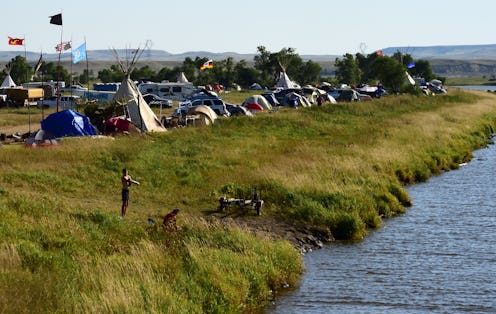Shortly after Thanksgiving, Dave Archambault, the Standing Rock Sioux Tribe's tribal chairman, received a letter saying that the land north of the Cannonball River would be closed to public use on Dec. 5 due to safety concerns. This land includes the Oceti Sakowin Camp, where water protectors have gathered for months to protest the construction of the Dakota Access Pipeline. This land has also historically been inhabited by the Dakota, Nakota, and Lakota peoples. Now, a "free speech zone" at Standing Rock for anyone who wishes to "to peaceably protest" the pipeline has been created, and Archambault and the rest of his tribe have been encouraged to relocate south. However, the Army Corps of Engineers said in a statement Sunday that it had "no plans for forcible removal."
What has essentially happened is that an eviction notice has been issued to the Standing Rock Sioux and their allies. Just after Thanksgiving — a holiday that commemorates a fictional tale of merrymaking rather than a real one of genocide — Native Americans are once again being threatened with displacement as they have been throughout history. In response to the letter, Archambault issued a statement reiterating the Standing Rock Sioux's calls for the federal government to rescind all permits for the construction of the pipeline:
It is both unfortunate and ironic that this announcement comes the day after this country celebrates Thanksgiving — a historic exchange of goodwill between Native Americans and the first immigrants from Europe. Although the news is saddening, it is not at all surprising given the last 500 years of the treatment of our people. We have suffered much, but we still have hope that the President will act on his commitment to close the chapter of broken promises to our people and especially our children.
The establishment of a "free speech zone" is not just an act of displacement. It also implies that the water protectors may only protest the construction of the pipeline as it suits the government, whereas protest is not meant to be convenient. However, the Army Corps said in a previous statement on Nov. 14, "We fully support the rights of all Americans to assemble and speak freely, and urge everyone involved in protest or pipeline activities to adhere to the principles of nonviolence."
In its letter, the Army Corps of Engineers argued that it is evacuating the land north of the river because it is not a "sustainable location for the winter," and in the same letter it detailed the consequences for "trespassing" on historically indigenous land.
Furthermore, the letter stated that these steps are being taken in light of "violent confrontations between protesters and law enforcement officials." But Archambault argued in his statement, "The best way to protect people during the winter, and reduce the risk of conflict between water protectors and militarized police, is to deny the easement for the Oahe crossing, and deny it now."
Archambault did not take a moment in his letter to encourage his fellow water protectors to relocate south of the river. Instead, he reaffirmed his tribe's resolve to protect its water, and once again asked President Obama and the federal government to move the pipeline outside treaty lands or stop it altogether.
